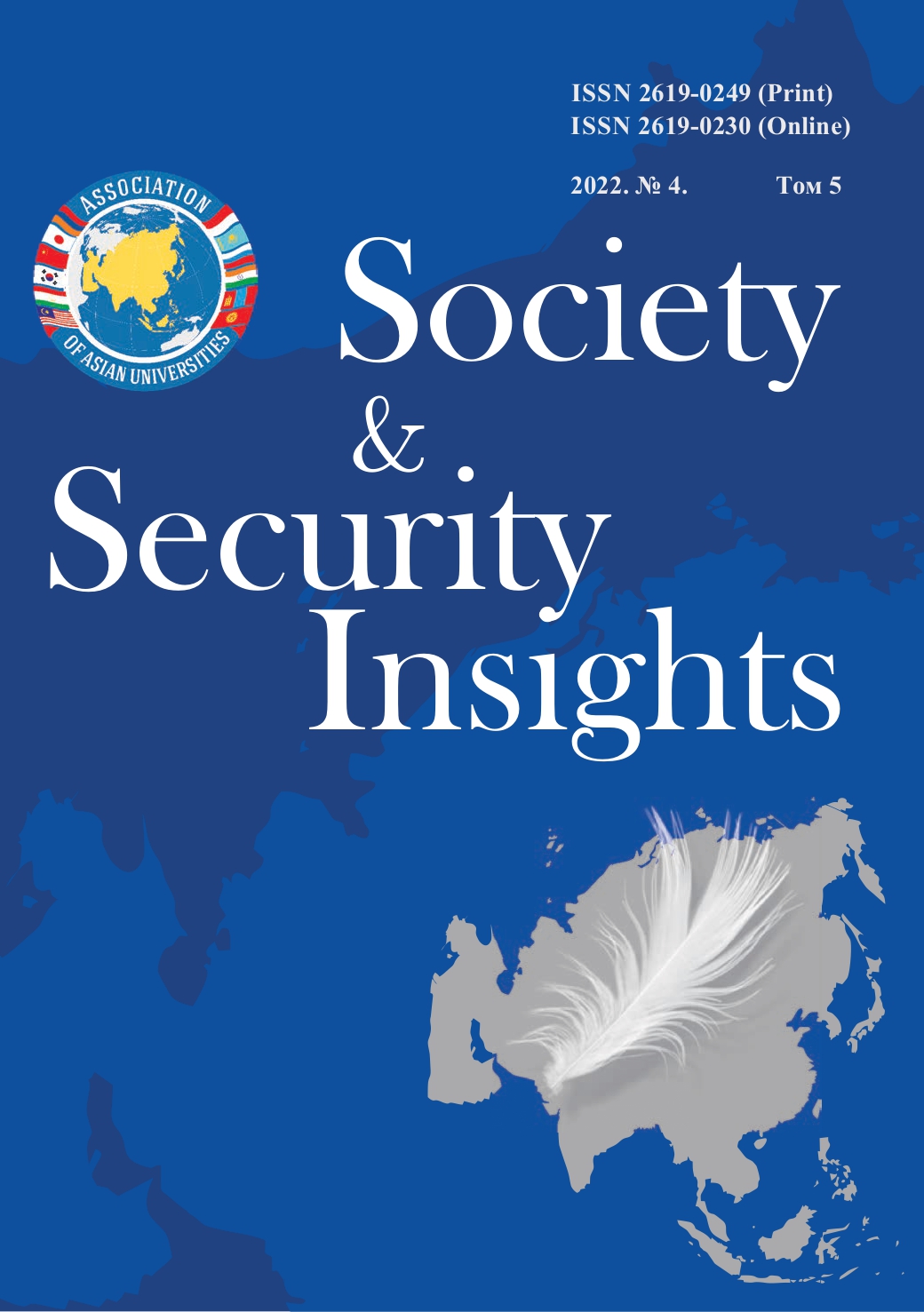ФОРМИРОВАНИЕ ПЕРФОРМАТИВНОЙ НАЦИОНАЛЬНОЙ ИДЕНТИЧНОСТИ МОЛОДЫХ РОССИЯН В ПОЛИТИЧЕСКИХ ПРАКТИКАХ
Основное содержание статьи
Аннотация
Статья предлагает рассмотреть проблему конструирования перформативной национальной идентичности молодых россиян в процессе политического участия на основе результатов проведенного эмпирического исследования. Целью данной работы является выявление типологии перформативной национальной идентичности на основе восприятия политического образа государства. Методологической базой исследования выступает понимание нации с позиций социального конструктивизма, репрезентация национальной идентичности анализируется как социальный перфоманс. Методом исследования выбрано фокусированное групповое интервью. В период июль-сентябрь 2021г. и январь-март 2022 года было проведено 9 фокус-групп с представителями разных категорий молодых россиян: подростки (от 14 до 17 лет), совершеннолетняя молодежь, работающая молодежь, «православная молодежь» на базе СПб ГБУ «Городской центр социальных программ и профилактики асоциальных явлений среди молодежи «КОНТАКТ». Результаты исследования позволили выявить различие в репрезентации национальной идентичности российской молодежи в зависимости от их политических взглядов и форм политического участия. Типологию можно представить в виде континуума, на одном полюсе которого находится понимание национальной идентичности в традиционалистской модели, на другом – в глобалистской модели. В том числе, исследование показало тесную связь категорий «патриотизма» и «национальной идентичности» в контексте восприятия различных символов, использующихся для конструирования исторической преемственности. Полученные результаты позволяют выявить и описать существующие типы перформативной национальной идентичности современной российской молодежи, что также необходимо для повышения эффективности воспитательной работы с молодежью.
Скачивания
Metrics
Детали статьи

Это произведение доступно по лицензии Creative Commons «Attribution» («Атрибуция») 4.0 Всемирная.
Authors retain the copyright of their manuscripts, and all Open Access articles are distributed under the terms of the Creative Commons Attribution License, which permits unrestricted use, distribution, and reproduction in any medium, provided that the original work is properly cited.
Литература
Бауман З. Текучая современность. Санкт-. Петербург: Питер, 2008. 240 c.
Гелленр Э. Нации и национализм: Пер. с англ./Ред. и послеслов. И.И. Крупника. М.: Прогресс, 1991.
Клеман К. Патриотизм снизу. «Как такое возможно, чтобы люди жили так бедно в богатой стране?»/ Кларин Клеман. М.: Новое литературное обозрение, 2021.
Миллер А. Нация, или могущество мифа. СПб.: Издательство Европейского университета в Санкт-Петербурге, 2016. 146 с.
Попова О. В. Модели идентичности политических акторов в современной России // Политическая наука. 2018. №2. С. 173-194.
Трынов Д.В. Политическое участие молодежи: поддержка vs протест // Социодинамика. 2019. № 12. С. 298–314. DOI: 10.25136/2409-7144.2019.12.31195.
Урри Дж. Мобильности / пер. с англ. А.В. Лазарева, вступ. статья Н.А. Харламова. М.: Издательская и консалтинговая группа «Праксис», 2012. 576 c.
Франц В.А. Особенности распространения протестных настроений в среде российской городской молодежи в условиях информационного общества (на примере Екатеринбурга) // Философия и гуманитарные науки в информационном обществе, 2020, №3. C. 61-80.
Billing M. Banal Nationalism. L.: SAGE Publications, 1995. 201 p.
Foucault M. The History of Sexuality, Volume 1: An Introduction. N. Y.: Pantheon Books, 1978. 164 p.
Giddens A. Modernity and Self-Identity: Self and Society in the Late Modern Age. – Stanford: Stanford Univ. Press, 1991. 264 p.
Glick Schiller N., Basch L., Szanton Blanc Ch. Transnationalism: a new analytic framework for understanding migration // Towards a Transnational Perspective on Migration: Race, Class, Ethnicity, and Nationalism Reconsidered / eds Glick Schiller N., Basch L., Szanton Blanc Ch. New York: New York Academy of Sciences, 1992. P. 1-24.
Hutchinson J. The Dynamics of Cultural Nationalism; Gaelic Revival and the Creation of the Irish Nation. L; Allen & Unwin, 1987.
Hobsbawm E., Ranger T. The Invention of Tradition/ Cambridge University Press, 2012. 324 p.
Smith A.D. Ethno-symbolism and Nationalism: A Cultural Approach. NY: Routledge, 2009. 193 p.
Smith A.D. Cultural Foundations of Nations: Hierarchy, Covenant and Republic. L.: Blackwell Publishing, 2008. 245 p.
References
Anderson, B. (2016) Voobrazhaemye soobshchestva: razmyshleniya ob istokah i rasprostranenii nacionalizma [Imagined Communities: Reflections on the Origin and Spread of Nationalism]. Moscow, Kuchkovo pole.
Bauman, Z. (2008) Tekuchaya sovremennost [Liquid Modernity]. St Petersburg, Piter.
Billing M. (1995) Banal Nationalism. L.: SAGE Publications.
Foucault M. (1978) The History of Sexuality, Volume 1: An Introduction. N. Y.: Pantheon Books.
Franc V. (2020) Osobennosti rasprostranenija protestnyh nastroenij v srede rossijskoj gorodskoj molodezhi v uslovijah informacionnogo obshhestva (na primere Ekaterinburga) [Features of the spread of protest moods among Russian urban youth in the information society (on the example of Yekaterinburg)]. Filosofija i gumanitarnye nauki v informacionnom obshhestve, №3, pp. 61-80.
Gellenr E. (1991) Nacii i nacionalizm [Nation and Nationalism]. Moscow, Progress.
Giddens A. (1991) Modernity and Self-Identity: Self and Society in the Late Modern Age. – Stanford : Stanford Univ. Press.
Glick Schiller N., Basch L., Szanton Blanc Ch. (1992) Transnationalism: a new analytic framework for understanding migration // Towards a Transnational Perspective on Migration: Race, Class, Ethnicity, and Nationalism Reconsidered / eds Glick Schiller N., Basch L., Szanton Blanc Ch. New York: New York Academy of Sciences,.
Hutchinson J. (1987) The Dynamics of Cultural Nationalism; Gaelic Revival and the Creation of the Irish Nation. L; Allen & Unwin.
Hobsbawm E., Ranger T. (2012) The Invention of Tradition/ Cambridge University Press.
Kleman K. (2021) Patriotizm snizu. «Kak takoe vozmozhno, chtoby ljudi zhili tak bedno v bogatoj strane?» [Patriotism below. “Why it becomes possible, when people are so poor in such rich country?”]. Moscow, Novoe literaturnoe obozrenie.
Miller A. (2016) Nacija, ili mogushhestvo mifa [Nation or Myth Power]. SPb.: Izdatel'stvo Evropejskogo universiteta.
Popova O. (2018) Modeli identichnosti politicheskih aktorov v sovremennoj Rossii [Models of Identity of Political Actors in Modern Russia].Politicheskaja nauka. №2. Pp. 173-194.
Smith A.D. (2009) Ethno-symbolism and Nationalism: A Cultural Approach. NY: Routledge.
Smith A.D. (2008) Cultural Foundations of Nations: Hierarchy, Covenant and Republic. L.: Blackwell Publishing.
Trynov D. (2019) Politicheskoe uchastie molodezhi: podderzhka vs protest [Political participation of youth: support vs. protest] // Sociodinamika, № 12. – Pp. 298 - 314.
Urry Dzh. (2012) Mobilnosti [Mobilities]. Moscow, Praxis.


 https://orcid.org/0000-0002-4137-811X
https://orcid.org/0000-0002-4137-811X